An Oral-Formulaic Study of the Quran
An Oral-Formulaic Study of the Quran
Andrew G. Bannister
LEXINGTON BOOKS
Lanham Boulder New York Toronto Plymouth, UK
Published by Lexington Books
A wholly owned subsidiary of Rowman & Littlefield
4501 Forbes Boulevard, Suite 200, Lanham, Maryland 20706
www.rowman.com
10 Thornbury Road, Plymouth PL6 7PP, United Kingdom
Copyright 2014 by Lexington Books
All rights reserved . No part of this book may be reproduced in any form or by any electronic or mechanical means, including information storage and retrieval systems, without written permission from the publisher, except by a reviewer who may quote passages in a review.
British Library Cataloguing in Publication Information Available
Library of Congress Cataloging-in-Publication Data
Library of Congress Cataloging-in-Publication Data
Bannister, Andrew G., 1972
An Oral-Formulaic Study of the Quran / Andrew G. Bannister.
pages cm
Includes bibliographical references and index.
ISBN 978-0-7391-8357-1 (cloth : alk. paper) ISBN 978-0-7391-8358-8 (electronic) 1. QuranLanguage, style. 2. Oral tradition in literature. 3. Quran as literature. 4. Orality in literature. 5. Arabic languageRhetoric. I. Title.
PJ6696.B26 2014
297.1'22dc23
2013050868
 The paper used in this publication meets the minimum requirements of American National Standard for Information SciencesPermanence of Paper for Printed Library Materials, ANSI/NISO Z39.48-1992.
The paper used in this publication meets the minimum requirements of American National Standard for Information SciencesPermanence of Paper for Printed Library Materials, ANSI/NISO Z39.48-1992.
Printed in the United States of America
Acknowledgments
I n looking back across the six years of research and writing that has produced this book, I am reminded somewhat of Tolkiens remark about The Lord of the Rings that the tale grew in the telling. Throughout the thinking, research, and writing, many people have been an invaluable aid to me. There is, alas, not room to mention everybody, but a few people do deserve special mention.
First, Id like to thank Peter Riddell and Steve Walton, my two doctoral supervisors who worked with me on the original PhD that lies behind this book. Their advice, guidance, and willingness to make themselves available for questions and discussion on everything from quranic exegesis, statistics, to the merits of Macs vs PCs was invaluable, as was their patience in wading through draft after draft of many chapters.
Second, many friends and colleagues have also been of great help, particularly in offering a useful sounding board off which to bounce many of the ideas in this book. In particular, Id like to mention Keith Small, Tanya Walker, Nick Chatrath, Sean Oliver-Dee and Mark Durie. The late Peter Hicks must also be mentioned, for without his support and encouragement, I would never have ventured into academia in the first place.
Third, Id like to thank Chris and Diana Kutyn for so generously providing space on Vancouver Island in which to work, write and edit; there is nowhere more beautiful or peaceful to write than in the mountains!
Finally, I am immensely grateful for the support of my family, especially my wife, Astrid. It was she who first encouraged me to step into academia back in 2000 and has faithfully stood by me as a degree became a masters which became a doctorate. Without her encouragement, love, and many sacrifices, this book would probably never have seen the light of day.
List of Abbreviations
Bukhri | Khan, Muammad Muhsin, The Translation of the Meanings of Sahih Al-Bukhari , 9 volumes (New Delhi: Kitab Bhavan, No date) |
L.A.E. | Life of Adam and Eve ( Vita Adae et Evae ) |
Muslim | iddq, Abdul amd (Translator), a Muslim: Being Traditions of the Sayings and Doings of The Prophet Muammad as Narrated by His Companions and Compiled Under the Title Al-Jami-u-a by Imm Muslim , 4 volumes (Lahore: Sh. Muhammad Ashraf, 1996) |
Q | Quran |
A Note on Transliteration
T he transliteration of Arabic terms and passages of the Quran in this book largely follows the Library of Congress system. 1,2 However, much of the transliteration, especially in chapters five to eight, is generated by the computer programs described in the study and may occasionally diverge slightly.
The Library of Congress system is as set out below:
Letters of the Alphabet
z | q |
b | s | k |
t | sh | l |
th | m |
j | n |
h |
kh | w |
d | y |
dh | gh |
r | f |
Vowels and Diphthongs
Notes
1. Diacritic marks are rendered for transliterations of the quranic text and for technical terminology (e.g., adth , sra ). They will not be shown for more everyday words (e.g., Quran, sura).
2. Described at http://www.loc.gov/catdir/cpso/romanization/arabic.pdf.

The Quran and Narrative Biblicist Traditions
O ne of the striking features of the Quran is the extensive use it makes of narratival material; brief, episodic accounts often focusing on people or individuals from the past. By some estimates, almost a quarter of the Quran is taken up with this kind of material. In terms of length, these stories can range from just a few verses, with the narrative sometimes woven into the wider argument of a sura, to whole chapters.
Many of these quranic narratives have been drawn from Biblicist traditions, tales that had their origin in a Jewish or Christian context. Perhaps the best example is the story of Iblis and Adam, which is told by the Quran not once but seven times. In this narrative, Iblis and the angels are summoned by Allah before the newly-created Adam and commanded to bow down. The angels obey but Iblis refuses and for his disobedience is flung out of heaven, uttering dire curses about how he will tempt and lead humankind astray. Versions of this story, of different lengths, can be found in the Quran in Q. 2:30, 34; 7:1118; 15:2844; 17:6164; 18:50; 20:116117 and 38:7185.
The Qurans use of this earlier Biblicist material raises important critical questions, not least, how, precisely, does the Quran source and deploy these pre-existing narrative traditions? Some critical scholarship in the past has been quick to try to use these stories to demonstrate concrete (often literary) connections between the Quran and the previous Biblicist writings. But as Walid Saleh remarks:
In so far as this material has to come from somewhere, it is obviously based, in one way or another, upon traditions that grew out of the Hebrew Bible... Unfortunately, most of the scholarship on Biblical material in the Quran has focused upon proving the latters dependency upon the former, as though this fact alone reveals something about the Quran. There has been a hunt to trace the antecedents of every piece of information to its supposed sources... If we insist on reading the Quran as a series of failed attempts to summarize Biblical stories, we cannot understand the deeper resonance that these stories evidently had with the pre-Islamic Arabs.
If overly-positivistic claims of dependency are, as Saleh cautions, unhelpful, what is the best explanation of the relationship between the Quran and those earliest Biblicist stories? Is it perhaps better to speak of influence, or of intertextuality, or of Muhammad drawing upon a common pool of oral narratives, known to his first hearers?
Next page
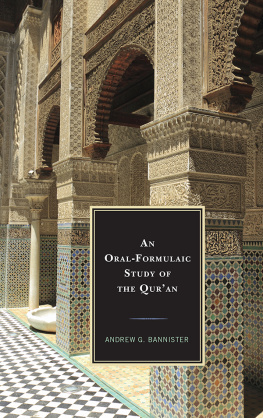

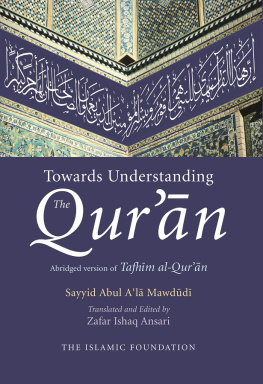

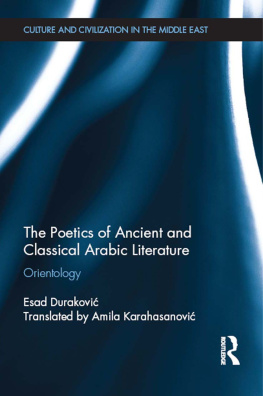
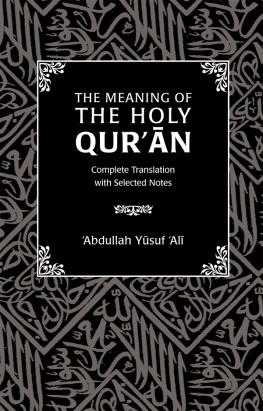
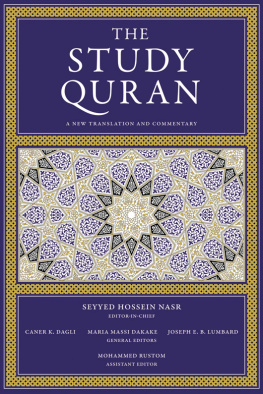
 The paper used in this publication meets the minimum requirements of American National Standard for Information SciencesPermanence of Paper for Printed Library Materials, ANSI/NISO Z39.48-1992.
The paper used in this publication meets the minimum requirements of American National Standard for Information SciencesPermanence of Paper for Printed Library Materials, ANSI/NISO Z39.48-1992.